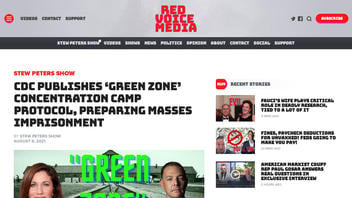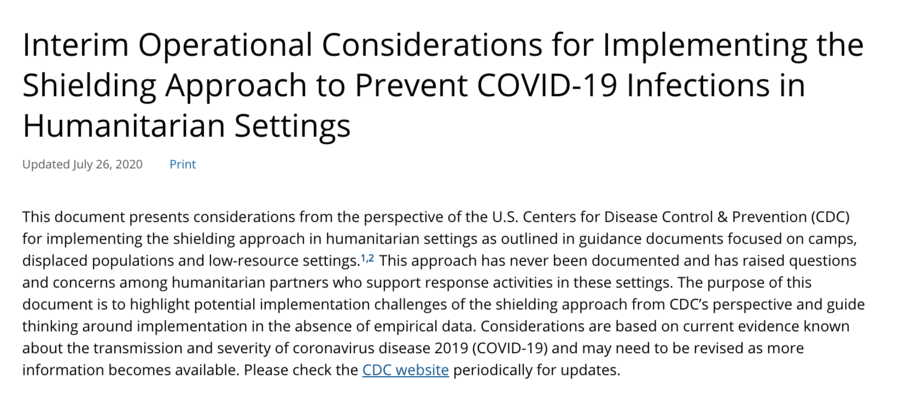
Did the CDC publish "Green Zone concentration camp protocol," preparing for mass imprisonment? No, that's not true: online radio host Stew Peters made the false claim about a set of Centers for Disease Control and Prevention guidelines that were last updated in mid-2020 regarding how the government would handle COVID-19 outbreaks in humanitarian or refugee camps in countries like Chad, Myanmar, and Syria. The document is not preparation for transporting U.S. citizens with COVID-19 to "concentration camps."
The claim appeared as an article published by Red Voice Media on August 6, 2021, titled "CDC Publishes 'Green Zone' Concentration Camp Protocol, Preparing Masses Imprisonment" (archived here) which opened:
The CDC is getting ready to transport "high risk" people to 'internment' camps, where they will be segregated for long periods of time. Find the document
Users on social media only saw this title, description and thumbnail:
CDC Publishes 'Green Zone' Concentration Camp Protocol, Preparing Masses Imprisonment
The CDC is getting ready to transport "high risk" people to 'internment' camps, where they will be segregated for long periods of time. Find the document
The article is based on a video from the Stew Peters show, where the host Stew Peters' multiple false claims regarding COVID-19 and other conspiracy theories have been repeatedly debunked by Lead Stories. Readers can see the stories here.
In the 9-minute video clip, Peters is joined by DeAnna Lorraine, who lost her race for U.S. House of Representatives in 2020, as Lead Stories previously reported on here. She makes the false claim that the government is building and putting people into concentration camps.
At the 35-second mark of the video Peters introduces the false claim:
Stew Peters: Internment camp does that mean concentration camp? What exactly is this?
DeAnna Lorriane: Well of course, I mean they're gonna wrap it in some fine dressing and they're actually actually calling it 'Green zones,' everything that they have labeled green is sort of a friendly zone, right? It's innocuous. So Gen Z is what they're labeling it, aka internment camps or concentration camps. And this is known as the shielding approach and it's right there on the CDC website."
The page Lorraine is referring to on the Centers for Disease Control and Prevention is titled, "Interim Operational Considerations for Implementing the Shielding Approach to Prevent COVID-19 Infections in Humanitarian Settings," and it was last updated on July 26, 2020. It does not mention this guideline is for U.S. citizens but instead refers to "humanitarian settings as outlined in guidance documents focused on camps, displaced populations and low-resource settings." These are not "concentration camps" or "internment camps" that are being built in every neighborhood in the United States, as Lorraine falsely claims.
"Green Zones" are described under the section "What is the Shielding Approach," as the area within the humanitarian setting that people who are deemed "high risk" would be temporarily relocated. This area would keep people who are at a high risk of contracting COVID-19 separated from people who are deemed to be a "low risk":
What is the Shielding Approach1?
The shielding approach aims to reduce the number of severe COVID-19 cases by limiting contact between individuals at higher risk of developing severe disease ("high-risk") and the general population ("low-risk"). High-risk individuals would be temporarily relocated to safe or "green zones" established at the household, neighborhood, camp/sector or community level depending on the context and setting.1,2 They would have minimal contact with family members and other low-risk residents.
The introduction of the document opens:
The CDC document refers to areas where the guidelines may be applied as "humanitarian settings." The documents specifically cites three countries -- Chad, Myanmar and Syria -- where the guidelines may need to be enacted as policy if the COVID-19 outbreak continued:
Given the limited resources and healthcare available to populations in humanitarian settings prior to the pandemic, it is unlikely sufficient hospitalization capacity (beds, personal protective equipment, ventilators, and staff) will be achievable during widespread transmission. The national capacity in many of the countries where these settings are located (e.g., Chad, Myanmar, and Syria) is limited. Resources may become quickly overwhelmed during the peak of transmission and may not be accessible to the emergency affected populations."

















